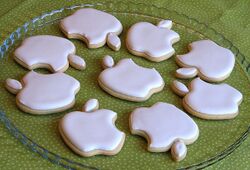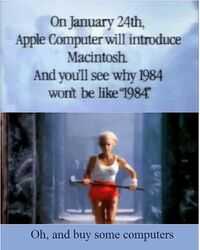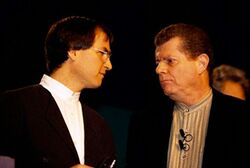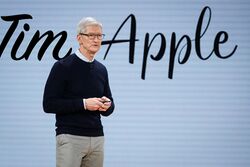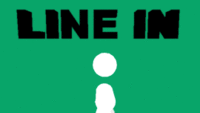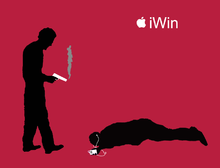Apple Inc.
Apple Computer Inc. is not just a computer/portable device company, but at its inner core a philosophy. It's a philosophy of life, of living, of being alive, of stayin' alive, and of livin' la vida loca. It is a way of thinking and consuming overpriced monochrome technology that's designed with elegance.
Apple is known for their iMiracles regularly excreted by Great Leader Steve Jobs Tim Cook, such the Macintosh iMac, iPod, iPhone, iPad, and iHamster. In commonality with Buddhist thought, Apple, Jobs, and his workers are to be considered One, with shared consciousness and utter dedication to the Whole, from which new products emerge. All of Apple's products are guaranteed top-of-the-line and "double-plus good."
Apple's triumph in the global technology industry has been based on a clear ideology of innovation, and abiding to these slogans: "Think Different" and "It Just Werks". In due time, Apple soared through the market and survived the tech-wars of the '90s, defeating economist's expectations again and again. They are now stronger than ever, having emerged from the patent wars with Samsung. By the time founder Steve Jobs had passed away, he was the undisputed champion of technology and America's true computing icon.
History[edit]
1976–84: Founding[edit]
Apple was founded in 1976, when the Great Leader Steve Jobs received a vision of purity and infinite aesthetic, reputedly inspired by George Orwell's Nineteen Eighty-Four. His vision was of a collective society transformed and unified under the mysticism of minimilism and simplicity.
Jobs' first attempt at capturing this vision was the iSandwich, a specially microchipped tuna baguette that played music whilst in the stomach. He was quickly persuaded to discontinue the product after customers complained that the sewers were becoming "too musical".
1984–91: Good Times[edit]
As Jobs had no one to transcribe his vision into words, his second attempt was to create a computer out of the collective debris of drug paraphenalia and organic matter located on the floor of his mother's kitchen. Featuring voice-recognitition software, he could now dictate directly into the machine and thus make the machine—the Macintosh—the vehicle for his new philosophy.
The first ever Macintosh was released on January 24, 1984, accompanied by what would soon become an Apple trademark: a brilliant marketing campaign. During the 1984 Super Bowl, Apple aired a now-iconic advert that was directed by Ridley Scott and cost the company a fortune in cash and souls. The ad was entirely incomprehensible, and seemed to suggest that if there were more sporty-looking women with sledgehammers, then nightmarish governments could be defeated.
The ad got everyone talking, nonetheless, and sales shot up, saving the company from the potential bankruptcy caused by the huge cost of the advert. The Macintosh was Apple's first commercial success, putting them firmly on the tech map and raising profits to create their first subsidiary. While Apple wasn't the first company to sell a computer, they were the first to do so with flashy packaging and state-of-the-art branding and marketing.
By 1985, Jobs's behavior had become increasingly erratic, and he was soon cast out in the cold by new Apple CEO John Sculley. He then decided to bugger off and found the company NeXT. Nevertheless, Apple continued to be successful for a few more years without Jobs.
1991–97: Decline[edit]
The success of Apple's lower-cost consumer models eventually blew up in their face, and led to cannibalization of their higher priced machines. To address this, management introduced several new brands, selling largely identical machines at different price points aimed at different markets. These were the too-hot Quadras, the too-cold Performa series, and the just-right Centris line. This led to significant market confusion, as customers did not understand the difference between the hundreds of junk-hunks Apple was putting out at a suicidally overconfident rate.
Apple also experimented with a number of other unsuccessful consumer targeted products during the 1990s, including digital cameras, portable CD audio players, speakers, video consoles, online services, TV appliances, nose-hair trimmers, lava lamps, DJs stereo systems, mugs, t-shirts, talking drums, breakfast cereals, orangutans, and fruit bats. Enormous resources were also invested in the bug-riddled Newton — a PDA that was a forerunner to the iPhone of sorts — based on Sculley's unrealistic market forecasts. Ultimately, none of these products helped Apple's market share, and Microsoft pulled ahead of them by a 700,000:1 margin.
Throughout this period, Microsoft continued to gain market share with their landmark OS, Windows 95, with provocative "x-treme" and "in-your-face" advertisements, while Apple was delivering a richly engineered but meek experience. Apple relied on high profit margins and never developed a clear response; instead, they sued Microsoft for using a GUI similar to the Apple Lisa in Apple Computer, Inc. v. Microsoft Corp. The lawsuit dragged on for years, and Apple became preoccupied with crushing Microsoft, distracting them from the series of major product flops and missed deadlines that soiled their good name. Once the suit was over, Sculley was fired for incompetence and replaced as CEO by Michael Spindler.
In 1996, after several more fuckups, Spindler was replaced as CEO by Gil Amelio, a man renown for his charisma and prowess in speechmaking. He ran Apple much akin to a ship with a hole in the bottom: there's a treasure onboard, but the ship is sinking, and everyone is chaotically rowing in different directions. After extensive layoffs, cut costs, and humiliation by the press, Amelio opted to purchase NeXT and its NeXTSTEP operating system and bring Steve Jobs home where he belonged.
1997–2007: Comeback[edit]
Following six years of decline, Steve Jobs returned to Apple as CEO. After unfucking the company and making a fortune in their IPO, Jobs directed them away from computers and into the competitive portable device market, against the sound advice of everyone around him. Those who stayed are now rich and those who left became depressed, overweight couch potatoes.
Jobs conceived the iPod, a portable music player with marginally better quality than that of a Walkman. He decided to make the damn thing incompatible with all computers other than Macs and to people to buy from his online music store iTunes, which previously was a free service dedicated to hosting the music stylings of Jobs.
2007–11: World domination[edit]
Over the next half-decade, orchestrating from his ranch near Waco, Texas, Jobs created an ever-more diverse set of instruments, each embodying the spirit of Apple. Each successive device allowed Apple greater and greater control over its followers. Finally, in 2011, the Singularity was reached, in which the entire Earth became part of the Whole.
2011–present: Tim Apple[edit]
The Lord Steve Jobs died of pancreatic cancer in 2011. Distraught at losing their beloved leader, Tim Cook and the rest of Apple's board of directors built the iSteve 1. iSteve came complete with a bulletproof carbon fibre turtleneck, death ray vision, a flamethrower in his mouth, a coffee dispenser, and a string in his back that when pulled, made him say buzzwords like "amazing" and "cool". Still, iSteve could not cut and paste, which nearly blew his cover at a corporate arts-and-crafts function. This was corrected with the iSteve2, but that died in a failed attempt to run two apps at the same time.
Tim Cook, too lazy to design an iSteve3, simply became CEO himself. Cook's first act as CEO was to reinstate "that fab-u-lous rainbow logo!" Apple had previously used from 1976 to 1998. Cook's tenure has been marked by him coming out of the closet, complaining about Donald Trump, presiding over increasingly lowering stocks, and reintroducing unnecessary numbered products; in time he may become John Sculley 2: Electric Boogaloo.
In 2020, Tim Cook changed his name to Tim iApple when he introduced the company's first in-house silicon chip for desktop and laptops. This broke their relationship with Intel. Old computer architecture were thrown out, door locks changed, and a new Apple had emerged. They were now closer to their dream of making everything Apple-branded, even down to cars and clothing. You would never need to look at another operating system ever again or wear non-branded Apple apparel.
Products[edit]
By the power invested in Steve Jobs by the capitalist society of America, Apple makes tons of gadgets that have numerous uses. Unlike Microsoft, Apple doesn't condone the use of child labor for the construction of its electronics. This is not because Steve Jobs is ethical; it's because, as Jobs says: "Children's fingers are too fat!"
This is why Our Lord and Savior Steve Jobs forces fetuses, with their small yet extraordinary nimble fingers, to make his products. Chinese fetuses. On average, the typical Chinese fetus can build twenty iPods during the second trimester. If any babies fail to meet this required minimum, the all-powerful Steve Jobs forces the mother to have a back-alley late-term abortion.
iMac[edit]
If the iPod is the soul of Apple, its brain is the iMac (even though it is technically just a poncy computer). Just like a brain of a human, the iMac serves no real purpose because doing anything useful on it is overly complex. This is why it is only used by college drunks to edit pictures and videos of them partying and having sex in the shopping mall parking lot.
To increase the user base of the Macintosh, they renamed it iMac. This was an ingenious move which made Linux users hate Apple even more. Their hate only served to create the popular slogan, "iAmGladNoDirtyLinuxfagsUseThis!", which helped Apple convince everyone that the iMac was a good product.
Mac Mini[edit]
The not-so-long-ago release of the Mac Mini has encountered many problems, including memory loss and compression failure. Apple has recently fixed these problems and hope that they can continue to sell the Mac Mini after its shaky beginning. Even Bill Gates is recorded as saying "It's even better than the original. It makes me want to get back into the computer industry, and I would in a heartbeat...if I weren't so busy being retired and donating to charity."
Macbook Air[edit]
The Macbook Air was an incredible experiment in non-existent technical design and the minimalism. These computers were engineered to be as thin as air and dissolve in your hands the moment you picked them up. Apple could offer traditional recipes meeting hi-tech fantasy and an absolute minimum atom count.
The Macbook Air took ten years to produce and were sold out a year before they went on sale. Apple decided to discontinue the Macbook Air, though there are rumours of its reintroduction, as several enthusiastic customers have threatened suicide if the line is permanently discontinued.
iPod[edit]
The iPod was Steve Jobs' brainchild: a mass multi-media storage device that revolutionized the music we listen to. Apple released a version of the iPod in 2006 that was manufactured with bramley apples, but was a flop due to them rotting and was discontinued one month after release.
iPod Shuffle[edit]
Apple realized that the iPod was great and all, but it needed to be more usable for blind people and more accessible to the poor, so they made the iPod Shuffle. Luckily, neither the poor nor the blind are smart enough to understand why it never plays the song they want it to. This allows those with iPod Touches or other MP3 players to laugh at the poor idiots, because they're special. Even Zune owners are better than the poor blind iPod Shuffle owners.
iPod Mini[edit]
After his first two worthless versions of the iPod, Steve Jobs then decided to make the iPod Mini, after receiving many complaints from all the elitist douche nozzles at the LGBT Brigade that the old model was, "too big", and it, "hurt their hands." Also they wanted it in poofter pink.
iPod Touch[edit]
While most companies try and invent new products to reach new markets, Apple boldly decides to just keep pumping out new variations of the same great taste.
iPhone[edit]
The iPhone is the first customizable biscuit that adapts to the needs of customers based on the language they speak, the needs of their working/leisure life and their ability to process sugar through their pancreas. The iPhone is portable and can be taken anywhere, is durable and can be placed safely in any pocket and will stay intact, even if dropped from 10 meters. It contains more vitamins and minerals than the next two leading telecommunication snacks combined. The phone is not only able to play tunes which soothe an upset stomach but can also keep a users doctors contact information on hand and call him if they become constipated or turn diabetic.
iPhone 4S[edit]
The iPhone 4S is the most complicated and exclusive portable device to reach humanity. It is the equivalent of sitting on a beach in Heaven drinking strawberry champagne while surrounded by anime girls, all elegantly placed into an elegant frame. The 4S comes not only with several manuals and various tools to enhance the process, but also a "personal assistant" named Siri, who gives advice on which module of the 4S you should select based on its measurements of your pupils and the status of your eyesight. Siri's best quality is the ability to make your iPhone experience less complicated and more savoury, less rigmarole and more satisfaction.
Those who can afford the iPhone 4S are known to own even three of them, one in their office, one at home and one that their family doesn't even know about. Apple realizes that the iPhone 4S is a source of guilty pleasure and is the secret of the rich and famous. Obama has ten which he taps on when he pulls all-nighters in the oval office.
iPhone 5[edit]
Originally released by Steve jobs in the Afterlife, the iPhone 5 is fully packed with so many new innovations that it is not even considered hi-tec, but instead transcendent-tec. Its greatest feature is how its onscreen rendering makes apps appear like old analogue gadgets only in digital form. In this way, one can eat any synthetic desert while looking at an image of the real thing.
iWatch[edit]
The iWatch Apple Watch New Apple Product That You Should Totally Buy is a screen that can be attached to the human wrist using the included strap. It has been hailed by reviewers and consumers alike as the best thing Apple has produced so far, thanks to its set of features including not doing anything, costing up to ten thousand dollars, and having a picture of fruit on the back. Several usual Apple critics have also given the product praise thanks to the fact that you can remove it from your wrist, giving Apple fans the illusion of free will while wearing it, although they never use this feature.
The smart watch is capable of doing everything the iPhone can do (i.e. not much at all) on a smaller screen, assuming said iPhone is present for the watch to connect to. The device is therefore commonly reported to be useful for preventing the wrist strain incurred by users, as a result of having to reach into their pockets and remove their phones. The iWatch also includes a "making you look like a dickhead" function, which is activated by wearing it. If you are patient enough to go through all the sub-menus, you can even get it to tell you the time; and if you are even more patient, get it to tell you the time in your own country. The iWatch operates using Apple's patented ugly-black-square technology; the device has been criticized for being nothing more than an overpriced second screen for the already overpriced iPhone. Oddly, many of these critics disappeared, only to be spotted months later wearing one of the now 'trendy' devices and telling their glaze-eyed friends repeatedly about how they love Apple's "integrated ecosystem" and how everything "just works".
iPad[edit]
After the failure of the iPhone, Steve Jobs felt the need to actually be creative for once and dreamed up the "iPad" it would be an electronic tampon of sorts that a woman could use to regulate her cycle, track her fertility, and even use as a mild birth control. In the end however, Jobs thought it would be more fruitful to make the iPad a "giant iPod" because study groups found the original to be too convenient.
Actually, the only reason the iPad lacks cell phone functionality is because users would look too stupid, even for an apple fan, holding a big tablet to their ear. Apple fanatics everywhere where shocked in March 2012 when video footage of a man chopping food on an iPad, rinsing it off, and then placing it in a dishwasher hit the internet. Apple fanatics were near suicidal by this sudden turn of events. Those with an I.Q. over 2 however stated that finally a 'legitimate use for the iPad' had been discovered.
iDanish[edit]
The iDanish was a bold experiment and a new ways of thinking about an old product. How could Apple take a round tin of Danish cookies and make them richer, more efficient, and extra buttery? By compacting a cookies density and cutting them into courageously new shapes, Apple managed to achieve optimal tin space and caloric economy. When Steve Jobs first told the public about the iDanish, no one believed it could be done. No biscuit manufacture had ever managed to fit two kilos of condensed cookies into a small tin box let alone 200 tons of it. Apple achieved its goal in record time and brought brittle cookies into the modern era. Scandinavian desserts became "cool" and the industry never looked back.
Popularity[edit]
The fanbase of Apple is comprised mostly of witty, humble, intelligent, soul-patch rocking, black sweater-wearing, latte-sipping, bearded college students in the 18–24 bracket who will buy an Apple product just because they know it's better than anything else on the market. No matter how poor you claim the graphics card or processor is, the most common argument that the Apple consumer will use against your claim is "The Mac is the best computer ever because the it's a Mac, and as we all know, you can't get viruses on a Mac. Suck it, Windows."
Every once in a while, some brave soul dares to ask: "Why do I keep buying Apple products? They're shit and extremely overpriced, but I just keep buying! WHY?!" Apple's response is always some along the lines of: "We own you. It's because you're such a valued consumer to us, and know we'll keep providing you with excellent products for many years to come at the most affordable pricing we can."
Ultimately, Apple offers tasty delights needed by a niche yet technologically-savvy, intellectually gifted, and fashion-forward sector of the human experiment. As long as Apple maintains its cosmic experience of producing pretty good computers in a way that no one dare dreamed, at prices the upper middle class can afford, it will forever innovate and make its mark forever on hi-gourmet-tec and new-wave-patisseries. Who wouldn't feel special being touched by the magic rod of Apple?
Controversy[edit]
Fruit Phone Disease[edit]
Along with the less common Blackberry, Apple's iPhone has contributed dramatically to the increase in "Fruit Phone Disease", a disease whereby consumers tell everyone they know—including friends who may have the same device—when they've bought one and subsequently can't put the damn thing down for more than five minutes.
Copyright infringement of Microsoft[edit]
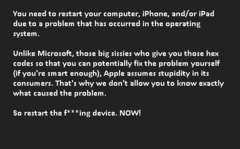
Apple has been known to ripoff take inspiration from Microsoft, on the grounds that "we can do everything better." Their version of Microsoft Office doesn't have all of stupid features Big Mike's version has, such as the ability to edit mathematical equations. It instead provides a lot of really cool new features, like 3-D effects in PowerPoint that are used in multi-million dollar movies such as The Hunger Games.
Even Apple's version of the popular Microsoft game, BlueScreen™ Ultimate Edition - In 3-D, is superior. All you have to do is sync your iDevice to win the game, unlike in the Windows version where you have to follow 353,654,746 steps to reboot your computer. Talk about usability!
No Flash[edit]
A controversial decision made by Apple is the lack of Adobe Flash in their products. This seems to conflict with the goals of their consumers, who visit Flash-based video sites like YouTube to watch videos of dogs doing wacky things. In response, Apple has stated: "Fuck Flash cause we don't own it. We believe Flash is antiquated and don't want to trouble our consumers with it."
Name[edit]
And the most confusing of all Apple's decisions is the name. Being a complete and utter genius, Steve Jobs claims to have coined the term "Apple" and even owns the copyright to the word. However, there are some who claim "Apple" is actually a type of fruit invented by Renaissance Man Johnny Appleseed and that one can buy a bag of apples from the grocery store. Some even claim people can grow their own apples in their own backyards (or front, if they want some commie who thinks the tree needs to "spread the delicious wealth" coming up and eating all their damn apples).
Apple responded to these claims with this statement:
| “ | The creator of the term 'Apple' is most certainly Steve Jobs. We can not speak of ongoing litigation, but charges have been brought against those who have blatantly abused our company name or likeness. We always have the best interests of our consumers in mind. They are the ones who truly the ones who suffer when someone misuses our brand name. Oh, and we are releasing a new version of the iPod! It is infinitely better than the current one on the market because it's RAINBOW COLORED! We hope everyone buys one for their relatives, and even one for themselves. It is being released at the unbelievable price of $10000! This is our greatest deal yet!" | ” |
Lawsuits[edit]
A key part of the Apple culture is to sue anything/body/company that creates a product or service than in any way, shape, form, or not at all resembles an Apple product.
In 2002, they sued McDonald's for the manufacturing of a hardware component called the "Big Mac". Apple claims that: "Should this hardware be put into place into the consumer market, it is in direct competition with Apple, and therefore stole the name Mac to make the burger appear more shiny, allowing them to charge $2200 to suckers who love shiny things." Apple lost this court case.
In 2010, Apple sued rival phone manufacturer HTC for having an unlock feature on it's phones; an idea, Apple claims, that they thought of. They attempted to sue HTC for 622 bazzillion dollars, but lost, as the judge ruled that this was not a real number. Later in 2010, they tried to sue an apple for stealing its name and logo.
In November 2011, Apple attempted to release their own brand of Cola, the iCola. During its trial run, Apple managed to sue Coca-Cola, Pepsi, Dr Pepper, and 59 other soft drink groups. The trial period ended 2 weeks after the initial release.
In February 2012, Apple were accused by Alcoholics Anonymous of inciting hatred against cats on their official website. The spokespersons for AA were later found to be drunk, and the case was dismissed.
In April 2012, Apple attempted to sue themselves over the design of the MacBook Pro. Now-CEO Tim Cook commented, "The MacBook Pro is direct competition for the MacBook Pro, and it is clear that the MacBook Pro has infringed Apple's patents." The case was dismissed before it went to court.
In August 2012, Apple successfully managed to sue Samsung for a billion dollars after convincing an iJury that it owned to rights to a newly invented shape tentatively named the iRectangle. Some commentators have reported that Apple appeared to have made a genuine mistake in this particular case - it is believed that the initial citation was to be against the use of iRectum (because Apple employees are so full of shit), but the work experience clerk in their legal office (who failed their Grade 5 English) incorrectly transcribed the legal citation. Nonetheless, Apple, being the cunts they are, continued with the law suit.
After several dismissed lawsuits, in May of this year Apple decided to sue the responsible judges. It was reported that CEO Tim Cook was solely behind this decision, which was later confirmed by Tim Cook himself. He was later arrested by authorities and imprisoned for 3 weeks. The case was dismissed.
See also[edit]
| ||||||||||||||||||||||
